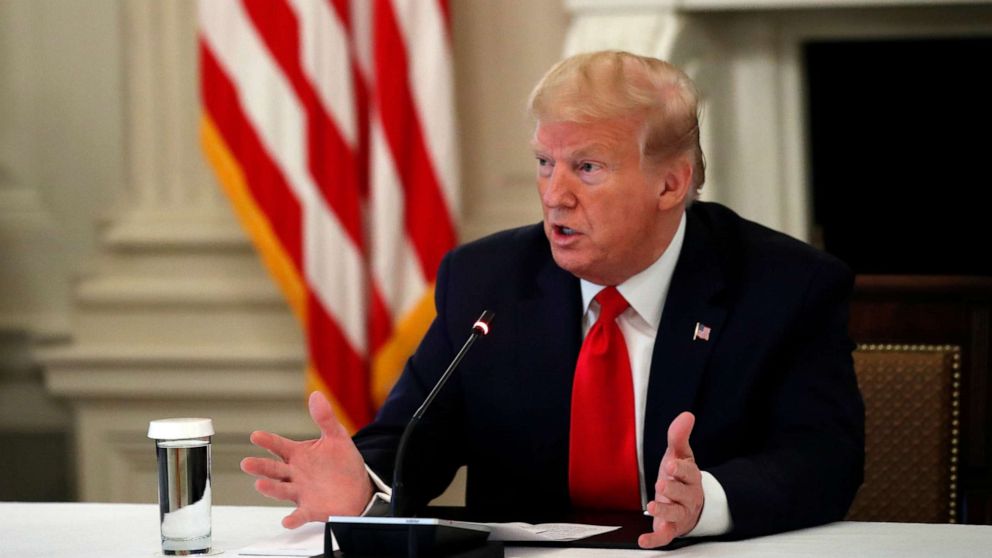Trump pushes payroll tax suspension unlikely to help unemployed, experts say
Instead of sending more direct relief to Americans hit by the economic impacts of the coronavirus pandemic, President Donald Trump has suggested he would prefer temporarily easing the tax burden on individuals and businesses -- but experts said those cuts may come with a big price tag for the federal government while doing little to help the over 30 million who have filed for unemployment in the past six weeks.
"I like the idea of payroll tax cuts. I've liked that from the beginning. That was a thing that I really would love to see happen. A lot of economists would agree with me," Trump said on Tuesday. "It would really be an incentive for people to come back to work and for employers to hire."
The president did not provide further detail on the exact nature of the cuts he'd like to see now, but in mid-March he urged Congress to suspend all payroll taxes until the end of the year, tweeting, "If you want to get money into the hands of people quickly & efficiently, let them have the full money that they earned."
But since payroll taxes are deducted from employees' earnings, those who aren't taking home a paycheck -- including the 3.8 million who filed for unemployment benefits for the first time last week -- wouldn't see any uptick in income. Many experts said that in addition to putting nothing back into the pockets of those who suddenly have no cash flow, the suspension wouldn't do much to spur hiring.
"When you do a temporary tax cut like what the White House is proposing, the literature generally finds there isn't a big effect on employment levels," said Garrett Watson, a senior policy analyst at the Tax Foundation, an independent tax policy nonprofit.
In addition to skipping over the unemployed, the change would have limited impact on populations most vulnerable to coronavirus-related health or financial risks -- service workers receiving fewer tips, workers without paid sick leave and social security recipients.
Payroll tax suspensions have been employed in the past with intention of spurring consumer spending, but even in circumstances without mass quarantines and forced closures, Watson said those reprieves appear to have done little to boost consumer demand.
"If you look at the 2009, 2 percentage points payroll tax cut under the Obama administration, the evidence bears out that most of that federal tax cut was saved by consumers," Watson said.
And like the reductions to payroll taxes during the Obama administration, Trump faces an uphill battle on Capitol Hill. Republican opposition was nearly unanimous to President Obama's 2009 cuts, and House Democrats have signaled Trump's proposal now is a nonstarter.
"On the left, the concern is more the downstream effects of how well targeted it is to low income individuals who are not employed right now -- and that it might be more of a windfall for the higher earners folks who are currently employed," Watson said.
Vermont Sen. Bernie Sanders tweeted the idea of a payroll tax cut was "pathetic" on Tuesday, advocating instead for a universal basic income.
"With rent due on May 1, we need to provide $2,000 a month to everyone until this crisis is over. If we can bail out corporations, we can make sure everyone has enough to pay for basic necessities," Sanders said in the tweet.
Some are also wary that since payroll taxes support Social Security and Medicare, even a temporary payroll tax cut could devastate the social safety nets.
The progressive advocacy group Social Security Works tweeted earlier this month that Trump's "so-called 'payroll tax holiday' has nothing to do with helping workers and everything to do with undermining Social Security."
Trump has both threatened to make cuts to Social Security and promised to "save" the program in the past, but his repeated endorsements of suspending payroll taxes has increased anxiety on the left. In early April, he said he would be pushing for the policy change regardless of circumstance, and he floated the cuts last August to offset a comparatively mild period of economic turbulence.
Some have balked at the high price tag that would accompany suspending all payroll taxes until the end of the year, which add up to half a trillion dollars.
Watson noted that while implementing nuanced payroll tax cuts for only certain businesses or income brackets could add an additional layer of complexity to the relief efforts, it could significantly reduce the cost incurred to the federal government and potentially provide a middle ground between the executive and legislative branches.
However, Trump has said he favors the idea of doing away with all payroll taxes until 2021 because it's straightforward.
"I think, frankly, it's simple," he said Tuesday.




